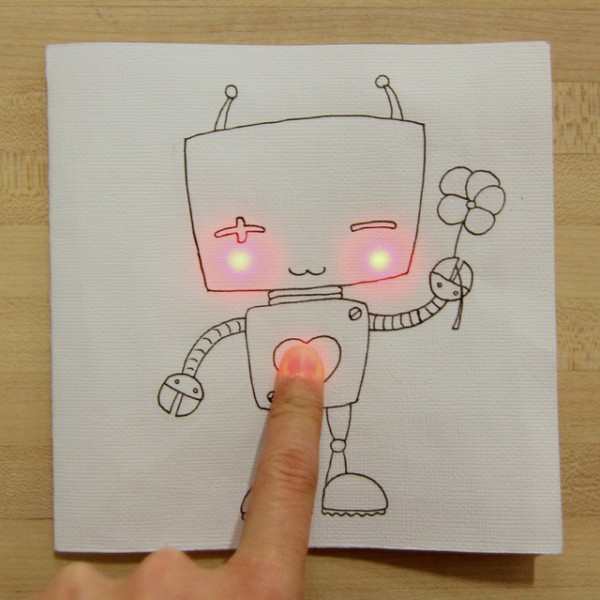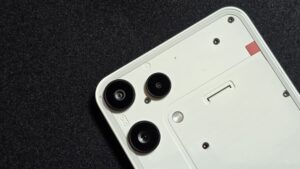
Walk into Bunnie Huang’s apartment on top of the popular Bras Basah Complex and it seems like you’ve entered a dark, geeky cave.
Strewn all around are hundreds of cables, controllers and circuits. Laptops seem to be busily connected to the latest DIY projects.
In the main living area, there is a bed, a reminder that this HDB apartment, with air-con turned on and curtains drawn, is the working studio of one of the most exciting projects to come out of Singapore’s recent efforts in fostering a maker culture.
Bunnie’s work with his colleagues is simple. By combining uniquely-designed circuits boards with conducting tape, he is out to produce kits for children to create interactive post cards and other knick-knacks that are fun, yet innovative.
Called Chibitronics, the project is about getting kids some early hands-on experience with electronics, he said in a meeting with Techgoondu recently. What’s different is the interaction with paper and circuits, rather than the touch screen of an iPad.
Perhaps more than any other such “makers” in Singapore, he is not only making something himself, but encouraging young ones to make something with his kits.
Make no mistake. Maker culture is big in Singapore, as it is in places like the United States and Europe.
In the past two years, Singapore designers have come up with new 3D printers for users to create their own figurines, while well-attended community events and even the government’s promise of funds for DIY projects have turned the Little Red Dot into a hotspot for such maker projects.
What this turn of events also reveals is the dearth of DIY skills in Singapore. It is obvious now that the emphasis is on getting your hands dirty with tweaking an Arduino circuit board or editing some programming code.
This goes against the old idea that what can be bought should be bought, and what can be outsourced cheaply can be outsourced to someone else.
The mindset change is a crucial one. Since the departure of many electronics manufacturers in the 2000s, Singapore has tried to move away from the hardware of hard disks to the exciting realm of digital media, like games or social media.
Visit any startup show in Singapore, and you’ll notice a depressingly large number touting the latest copycat of Facebook, Groupon or the like. It’s hard to find innovation in hardware.
Maybe it’s hard work that cannot be easily farmed out to, say, programmers in the Philippines, India or China. Or, perhaps there’s the perception that Singapore is too small a market compared to Shenzhen, China, where the action is.
More likely, the situation speaks of Singapore’s lack of expertise in hardware design, which requires lots of hands-on knowledge. That, itself, is because electronics engineering has hardly been the hottest thing to study in polytechnics or universities until a recent resurgence in interest.
Few companies in Singapore – other than Creative Technology, and how its stock has fallen in Singaporeans’ eyes of late – have made it big by making hardware. Last year, however, you’ve probably heard of Viki, a video site that made headlines after being sold for US$200 million.
So, the return to geeky hands-on projects is a welcome change for Singapore. It’s also an area where expertise is sorely lacking, after years of emphasising the need for project managers rather than “do-ers” – the coders and engineers.
The good news is there is a small number of Singapore companies developing great stuff again of late. One example is the TouchPico, a pocketable Android PC cum projector that lets you easily interact with games and other programs on a wall, just about anywhere you go.
Also encouraging are the young attendees attracted to many maker fairs. Any culture starts easier from young, and learning how to program your first robot or interactive postcard is a great start.
Many more will, hopefully, pursue innovative hardware projects, perhaps in a dank apartment somewhere in Singapore, since there aren’t many garages here, to produce the type of innovation that started Hewlett-Packard and which has characterised Silicon Valley.
Hopefully, too, government planners would not be so quick to proclaim success when things go well, and go cold with funding and support when the next big trend comes along.
Innovation takes time. And this time, it seems Singapore is sinking the right roots for the long term.







Chibitronics reminds me of electric paint http://www.bareconductive.com/. I wonder how much freedom the children are allowed to create the cards without the teacher’s assistance though. Teachers may help too much if the child’s project is not going to look good enough for their parents who paid not very little and expect Einsteins out of their kids with all kinds of unique programs.
Yes, I think the projects for the young should be about exploration not competition.